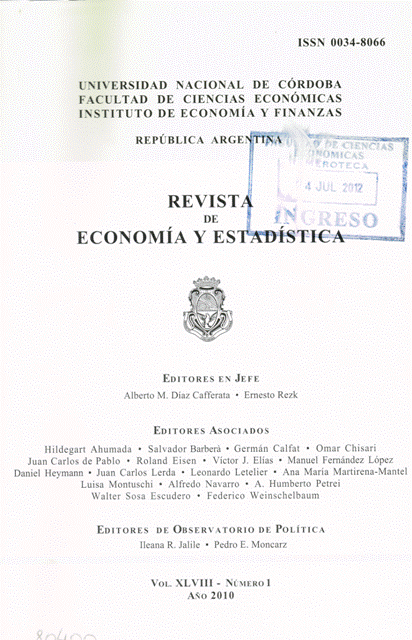El activismo fiscal en los auges, las crisis y más allá
DOI:
https://doi.org/10.55444/2451.7321.2010.v48.n1.3872Palabras clave:
consolidación, políticas de gasto, activismo fiscal, auge y caídaResumen
Este documento analiza las políticas fiscales activas durante el período de auge, durante el período de crisis y durante el período posterior a la crisis. El estudio argumenta, en primer lugar, que las políticas fiscales fueron demasiado imprudentes durante la fase de auge anterior a la crisis. Esto se debió al crecimiento excesivo del gasto y a problemas con la medición de la brecha del producto y la posición fiscal. En segundo lugar, durante la crisis, en varios países se puso demasiado énfasis en la necesidad apoyo fiscal (activista) a pesar de los excesos de demanda en los años de auge. El activismo fiscal se centró menos (y menos fuerte de lo necesario) en la naturaleza de balance de la crisis y en la mala asignación de recursos. En tercer lugar, y teniendo en cuenta los fuertes incrementos en las tasas de gasto público durante la crisis, estrategias de política fiscal tienen que llevar el gasto público a niveles sostenibles con el fin de recuperar la sostenibilidad fiscal y crear un entorno propicio para la consolidación y crecimiento.
Descargas
Referencias
Afonso, A., Ch. Nickel and P. Rother (2005), “Fiscal Consolidations in the Central and Eastern European Countries”, ECB Working Paper No. 473.
Agnello, L. and L. Schuknecht (2009) Booms and Busts in Housing Markets: Determinants and Implications, ECB Working Paper 1071.
Bouthevillain, C., J. Caruana, C. Checherita, J. Cunha, E. Gordo, S. Haroutunian, G. Langenus, A. Hubic, B. Manzke, J. J. Pérez and P. Tommasino (2009), “Pros and cons of various fiscal measures to stimulate the economy”, Banque centrale du Luxembourg Working Paper No. 40, September, and Banco d’España Economic Bulletin, July.
Marco Buti and Paul van den Noord (2005),“What is the Impact of Tax and Welfare Reforms on Fiscal Stabilizers?”, in Willi Semmler (ed.), Monetary Policy and Unemployment, Routledge, pp. 252-271.
Cimadomo, J. (2008), “Fiscal policy in real time”, ECB Working Paper No. 919.
Detken, C. and L. Alessi (2009) Real time early warning indicators for costly assest price boom/bust cycles: A role for global liquidity, ECB Working Paper.
European Commission (2007) Public Finances in EMU, European Economy 3, Brussels.
European Commission (2009) Public Finances in EMU. European Economy 5, Brussels.
European Commission. European Economic Forecast. Autumn 2009. Brussels.
European Commission, forthcoming 2010, Surveillance of Competitiveness, Brussels.
Freedman, C., Kumhof, M., Laxton, D. and J.Lee (2009), “The case fro global fiscal stimulus”, IMF staff position note, SPN/09/03, Washington (D.C.), International Monetary Fund.
Guichard, S. et al. (2007), “What Promotes Fiscal Consolidation: OECD Country Experiences”, OECD Economics Department Working Papers, No. 553.
Hauptmeier, S., Heipertz, M. and L.Schuknecht (2006), “Expenditure reform in industrialised countries. A case study approach”, European Central Bank, Working Paper Series, No. 634, Frankfurt/Main, ECB.
Hauptmeier, S., F. Holm-Hadulla, P. Rother (2010), “The impact of numerical expenditure rules on budgetary discipline over the cycle”, forthcoming ECB Working Paper.
IMF (2009), “Debt bias and other distortions: crisis-related issues in tax policy”, IMF, Working Paper, Washington (D.C.), International Monetary Fund.
Jaeger, A and L.Schuknecht (2007), “Boom-Bust Phases in Asset Prices and Fiscal Policy Behaviour”, Emerging Markets Finance and Trade, Vol.43, No.6, pp.45-86.
Koopman, G.-J. and I.P. Székely (2009), “Impact of the current economic crisis and financial crisis on potential output”, European Economy Occasional Papers, XX/2009, Brussels, European Commission.
Kremer, J., Rodrigues Braz, C., Brosens, T., Langenus, G., Momigliano, S. and M. Spolander (2006), „A disaggregated framework fort he analysis of structural developements in public finances” ECB, WP No 579, Frankfurt/Main, ECB.
Martinez-Mongay, C., Maza Lasierra, L.A. and J. Yaniz Igal (2007), “Asset Booms and Tax Receipts: The case of Spain, 1995-2006”, European Economy Economic Papers, No 293, Brussels.
Melander, A. and J.Morgan (2009), “How has the crisis affected growth prospects? What are the main sources of uncertainty and how are they affecting economic activity?” delivered at Joint ECB/DG ECFIN Workshop, Frankfurt, 1-2 October 2009.
Morris, R. and L. Schuknecht (2007), “Structural balances and revenue windfalls. The role of asset prices revisited”, European Central Bank, Working Paper Series, No 737, Frankfurt/Main, ECB.
Nickel, C. and I. Vansteenkiste, “The interaction between fiscal policy and the current account: the role of Ricardian equivalence”, Frankfurt, memeo.
Tagkalakis, A. (2009) Fiscal adjustments and asset price movements, Bank of Greece Working Paper 104.
Tanzi, V. (2009), “Comments on recent fiscal developments and on exit strategies” delivered at the “Vancouver Seminar: The Crisis Response and Road to Recovery”, Bank of Canda, November 30-December 1, 2009, Vancouver, Canada.
Tanzi, V. and L.Schuknecht (2000), „Public spending in the 20th century. A global perspective”, Cambridge University Press.
Descargas
Publicado
Número
Sección
Licencia
Derechos de autor 2010 Ludger Schuknecht

Esta obra está bajo una licencia internacional Creative Commons Atribución-NoComercial-SinDerivadas 4.0.
Aquellos autores/as que tengan publicaciones con esta revista, aceptan los términos siguientes:
Los autores/as conservarán sus derechos de autor y garantizarán a la revista el derecho de primera publicación de su obra, el cuál estará simultáneamente sujeto a la Licencia Creative Commons Atribución-NoComercial-SinDerivar 4.0 Internacional que permite a terceros compartir la obra siempre que se indique su autor y su primera publicación esta revista.
Los autores/as podrán adoptar otros acuerdos de licencia no exclusiva de distribución de la versión de la obra publicada (p. ej.: depositarla en un archivo telemático institucional o publicarla en un volumen monográfico) siempre que se indique la publicación inicial en esta revista.
Se permite y recomienda a los autores/as difundir su obra a través de Internet (p. ej.: en archivos telemáticos institucionales o en su página web) antes y durante el proceso de envío, lo cual puede producir intercambios interesantes y aumentar las citas de la obra publicada. (Véase El efecto del acceso abierto)














